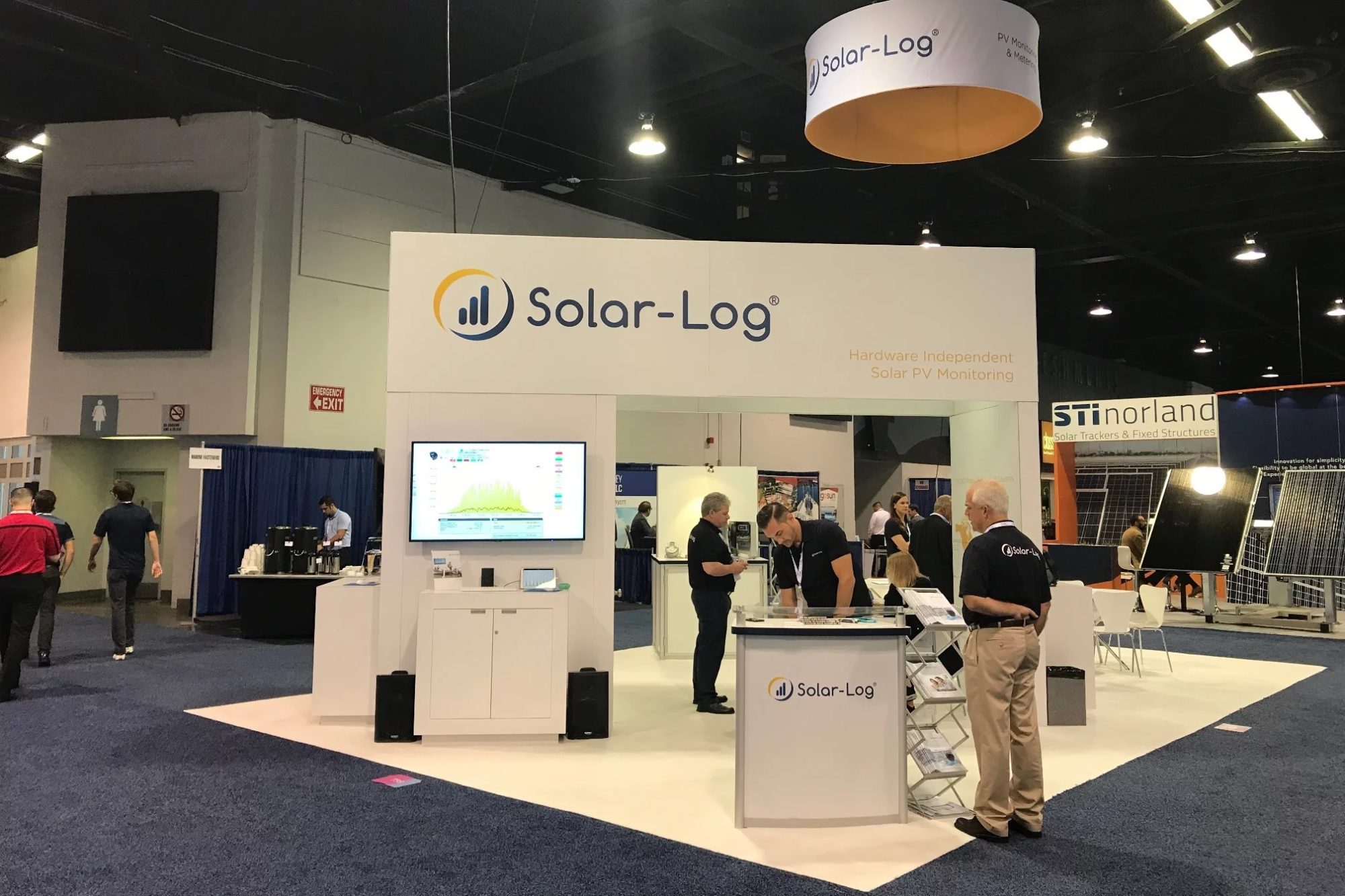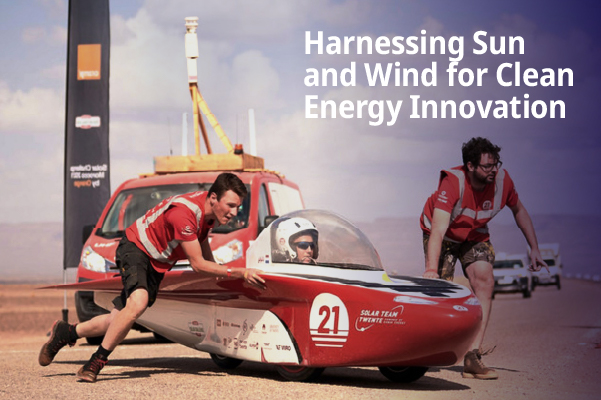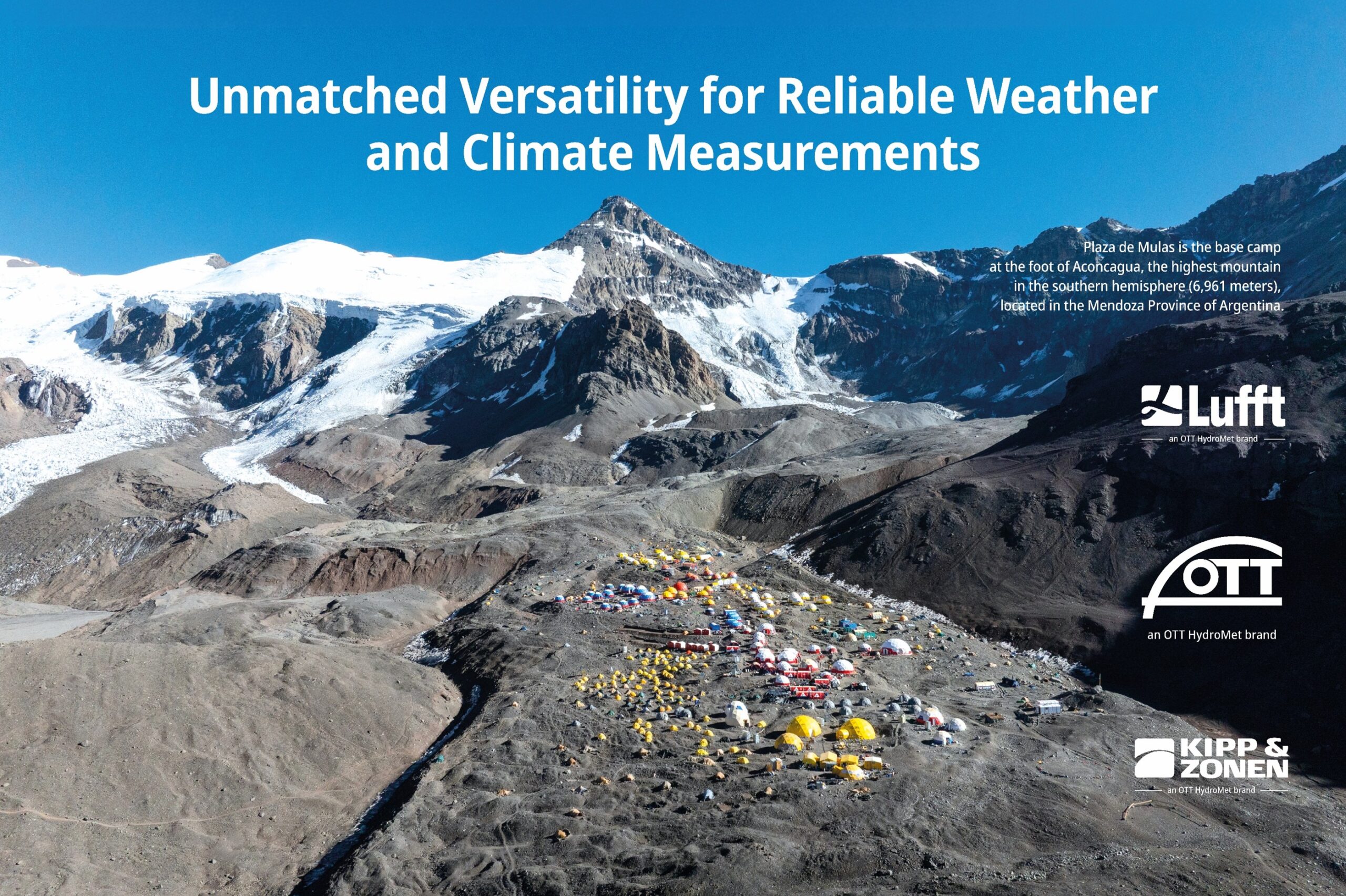What better way to connect to our customers and update the Solar Industry than the presenting ourselves at the annual Solar Power International (SPI) exhibition? With a large booth and a great team we showed the visitors of SPI what’s new on the monitoring side of a solar energy plant. DustIQ stole the show, again. Soiling is a influential and complicated matter when it comes to optimizing solar energy output. I’ve visited some key solar energy companies to ask their opinions on and struggles with soiling.
Solar-Log on the subject of soiling
One of the first I spoke with was Solar-Log™, that provides independent commercial and residential solar PV monitoring. Solar-Log is monitoring over 280,000 plants worldwide, through over 1 million connected inverters, with generating power totaling over 12 GW. Solar-Log™ offers continuous and reliable PV plant monitoring and easily integrates Kipp & Zonen pyranometers, either the analogue or the smart series.
On the subject of soiling Peter Scarola told me “Soiling plays a large part in the monitoring process. As our business is monitoring, it effects the module production output seen by our software. Keeping a regular maintenance schedule, combined with active monitoring is the best way to ensure maximum PV output.”
Good to know is that the new DustIQ to measure soiling has the same output as our smart series of pyranometers and Solar-Log is ready to connect it.
AlsoEnergy, the global leader in renewable energy asset monitoring and control
Hot news at SPI was the merger of Locus Energy and AlsoEnergy. Two key monitoring and software providers to the solar energy industry have joined forces and have taken leadership as the most innovative and complete solution provider in the market.
When I spoke to Holden Caine, CTO at AlsoEnergy, and congratulated him I asked him about the effects of soiling:
“Soiling effects our customers quite a bit, depending on where they are. Certainly in the South-West it’s significant. We provide a lot of tools to help with that. Such as algorithms and to look at the data to understand what the losses are. Historically and looking forward based on weather data. The data shows you the kilowatt loss per day or even the dollar loss per day so you can look forward and decide whether or not to clean.”
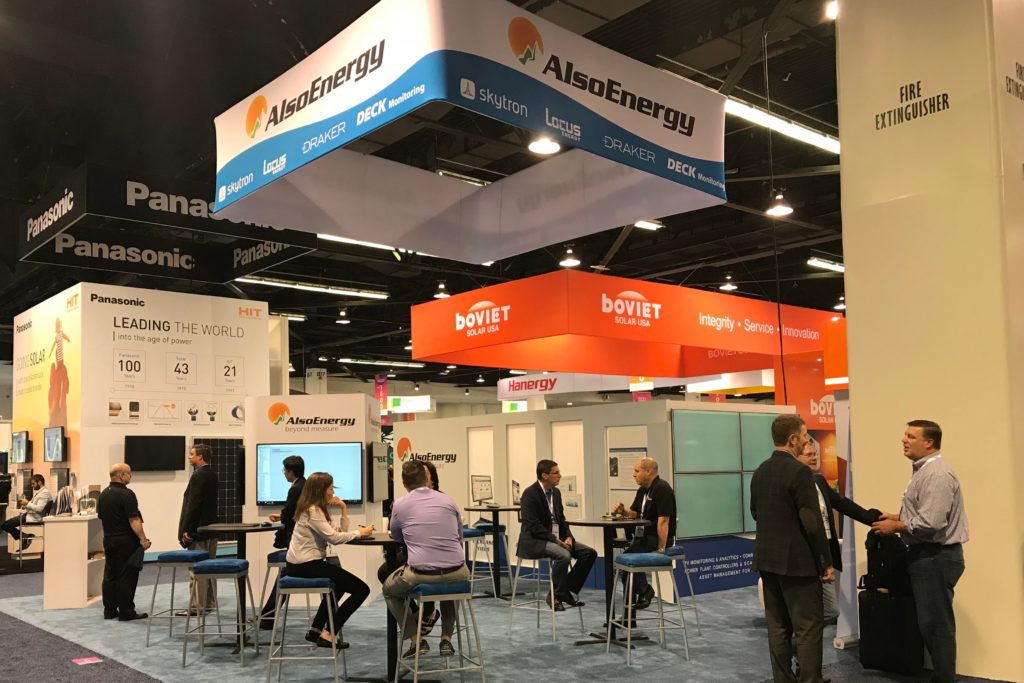
Soiling is difficult to quantify, but can cause major loss of energy production
To get the perspective on soiling from a manufacturers point of view I visited Talesun’s booth at SPI too. Talesun Solar delivers PV products, applications and services to promote global sustainable development. With an annual production capacity of 4 GW cells and 5 GW modules, Talesun Solar has built state of the art, fully automated production lines to offer cost-effective and high-efficiency products to the PV industry.
Their Director of Key Accounts, Derek Marchant, shared his concerns on soiling with me:
“The effect of soiling really depends on the installation, where it’s installed and the climatic conditions in that area. I’ve seen modules that are very dusty and dirty that haven’t been cleaned in a long time that I think loose up to 20% of production. And I have seen some instances where panels were really dirty in the central valley where there is a lot of agriculture and it’s very dry in the Summer. There is a lot of dust in the air that builds up on the modules and creates a really heavy film and reduces production. It’s difficult to quantify, I can’t see by how much but it must be a major loss of power from the soiling on the module.
It’s expensive to do a cleaning regime. You will need to pay somebody and they need to be insured to get up on the roofs. You can’t just hire anyone, it has to be a professional. So you can see cleaning the modules as an investment.“
The damage of soiling to PV when neglected
Across solar BayWa r.e. claims to r.e. think energy – how it is produced, how it can be stored and how it can be best used. They are a leading global renewable energy developer, service supplier, wholesaler and energy solutions provider. I asked one of their Accosiate Engineers about what they think of soiling, and here are some of the general comments made on the topic:
“Obviously soiling inhibits the modules to capture energy and because of that customers do not get the form of production they need. Also, if there is soiling for a long period of time it can damage modules and their ability to capture solar irradiance. Usually module washing and different types of sustainable bio degradable measures are utilized to clean modules and remove the possibility of soiling. That’s why we use reference cells to gauge the effects of soiling when comparing a clean module versus a module potentially impacted by soiling.
The biggest thing is being able to prevent it. We try to predict in what months soiling is likely to occur. And based on those months we try to do module washing beforehand so they remain clean and are limited by the amount of soiling that takes place.
Prolonged periods of soiling can yield negative consequences on modules especially in arid areas such as California, where soiling plays a critical role. Moreover, you would think rain can help alleviate this problem, but it doesn’t. What rain actually does is mix with the soil on a module to create an adhesive slurry that sticks to the bottom of modules when washed down by rain. Removing this slurry is harder for module washing services which then increases labor costs because it takes them longer to clean.“
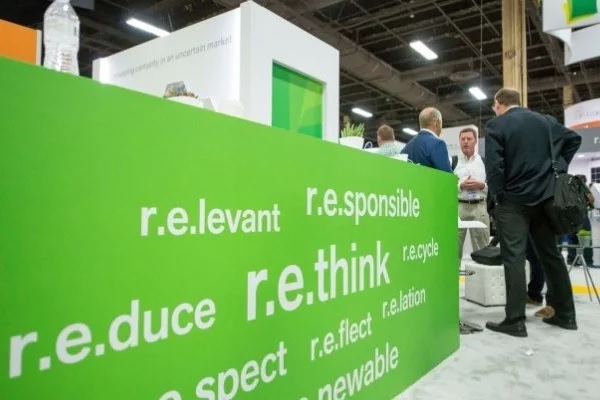
An anti-reflect coating on the glass helps to remove dirt
Hanwha Q CELL. is one of US’s largest photovoltaic manufacturers of high-performance, high-quality solar cells and modules. It is headquartered in Seoul, South Korea (Global Executive HQ) and soon opens a diverse international manufacturing facility in the United States. I stopped by to see if soiling was also on the concern of Q Cells and spoke to Maximilian Schurade, Director of Technical Marketing SuppoS Cort on the subject of soiling:
“Soiling is in most of the climatic regions not a big problem. But it’s true that it is more significant in some regions that are in desert conditions where there is a lot if sand for example. Than it can be critical. But usually in most conditions, most of the dirt is washed off. We have a anti-reflect coating on our glass that helps to easily remove dirt. In most cases this is enough to keep the modules clean under normal conditions in the required tilt angle. We are currently screening different types of cleaning machines to advise the best fit to our customers for regions where a cleaning in necessary.”
Soiling stations as standard for every project or not?
Nor-Cal provides consulting, engineering and training services to the traditional and renewable power generation industry. Nor-Cal is a full-system integrator and expert in our monitoring products. They have extensive experience and are one of the first to install 3 DustIQ soiling systems in the United States. A great reason to stop by and ask how Sean Keven, Technical Writer/Proposal Coordinator looks at PV panel soiling.
“Well first let me tell you that there is a subset of customers that use soiling stations on all of their projects and then there’s some that, I guess, don’t believe in it and don’t use it at all. How it effects it though, obviously soiling on panels and modules is going to decrease your efficiency and energy capture, directly affecting a plant’s revenue generating capability. In that case deploying soiling stations will give you the comparative reading of degradation in time, resulting in a more accurate picture of not just forecasted revenue generation, but the ability to anticipate module cleaning requirements to maintain the most efficient plant operation. The Dust IQ, being a well-designed product and carrying a price point far below its competitors, allows Plant Operatives the ability to cost effectively perform these functions.”
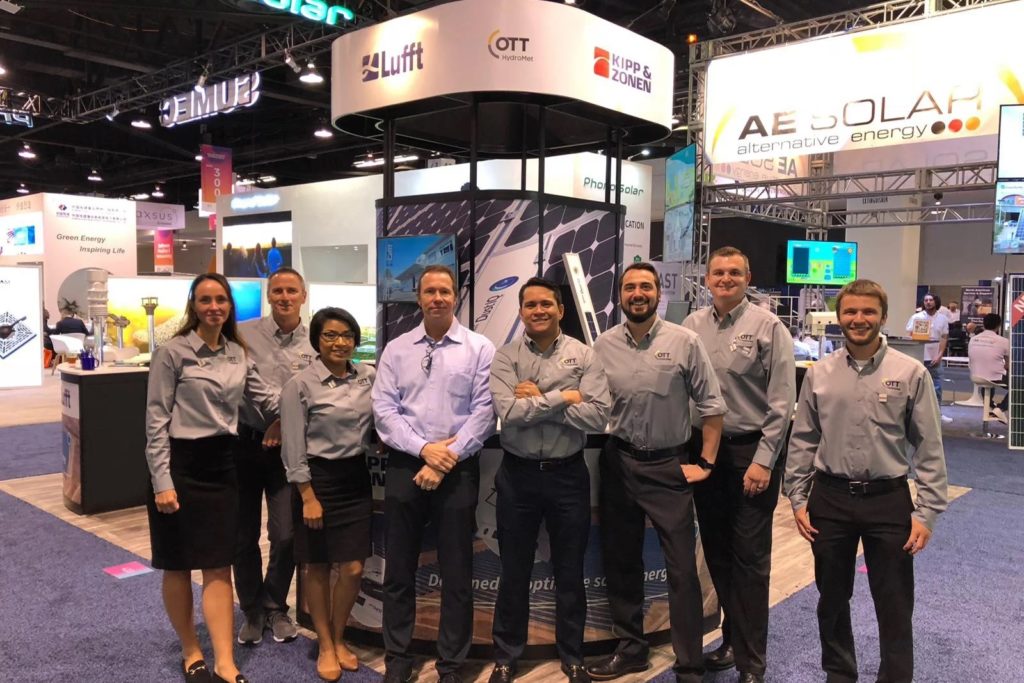
Thank you visitors of SPI 2018
After walking the grounds of Solar Power International and talking about soiling with so many key players in the solar energy market, it was clear that DustIQ is a clear response to market demand.
I will bring back all the insights on soiling to the team in Delft, the Netherlands. Where the DustIQ is being manufactured and distributed throughout the world.
On behalf of the entire team of both Kipp & Zonen and Lufft, as well as OTT associates, I would like to thank all visitors of SPI for their interest and we welcome you again next year in Salt Lake City!
